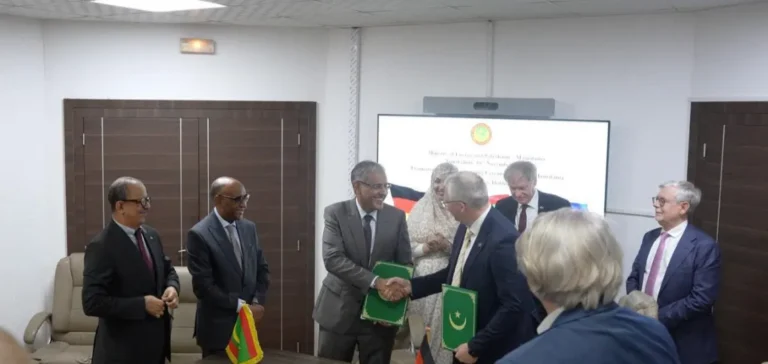Mauritania’s Ministry of Energy and Petroleum has signed a framework agreement with German company Möhring Energie Group to develop an industrial complex for green hydrogen and green ammonia. The agreement was signed in Nouakchott on November 18 by Minister Mohamed Ould Khaled and the company’s Technical Director Sascha Möhring, in the presence of official delegations from Germany and the European Union.
A phased project with a clear export focus
The project, named “NAYRAH”, will be developed in stages. The first phase includes the installation of 1 GW of electric capacity, enabling an estimated annual production of 140,000 tonnes of green hydrogen and 400,000 tonnes of green ammonia. This production will be entirely dedicated to export to European markets. According to the preliminary schedule, initial deliveries are expected in 2029.
This is the first German project to benefit from Mauritania’s new regulatory framework for green hydrogen, designed to attract international investment in the sector. The Mauritanian government is aiming to structure its energy strategy around foreign partnerships to leverage its solar and wind resources.
Increasing competition in the Mauritanian sector
Several other projects are currently under consideration in the country. In November, GreenGo Energy and S.E.T. Select Energy GmbH announced a co-development agreement for the “Megaton Moon” project, including a component to secure commercial off-take. This momentum reflects the growing interest of foreign players in Mauritania’s energy potential.
The national roadmap for low-carbon hydrogen estimates the annual potential at 20.1 million tonnes. The ministry states that using only 5% of the coastal regions for solar and wind installations could produce up to 12 million tonnes of green hydrogen per year. This figure strengthens the country’s appeal to industrial and institutional investors in the sector.
Strategic positioning over the long term
The NAYRAH project fits within a strategy to diversify Mauritania’s economy, while aligning with European market requirements for low-carbon fuels. The choice of Möhring Energie Group comes amid an ongoing global structuring of the hydrogen market, still marked by regulatory and technological uncertainty.
“This partnership opens a structured operational framework for the future of German projects in the region,” said Sascha Möhring after the signing. The joint presence of European representatives at the event also highlights the institutional attention paid to long-term industrial initiatives on the African continent.






















